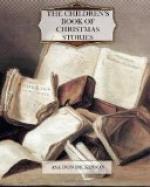He neither shall be born
In housen nor in hall,
Nor in the place of Paradise,
But in an ox’s stall.
XXVI. THE CRATCHITS’ CHRISTMAS DINNER
(Adapted)
CHARLES DICKENS
Scrooge and the Ghost of Christmas Present stood in the city streets on Christmas morning, where (for the weather was severe) the people made a rough but brisk and not unpleasant kind of music, in scraping the snow from the pavement in front of their dwellings, and from the tops of their houses, whence it was mad delight to the boys to see it come plumping down into the road below, and splitting into artificial little snowstorms.
The house fronts looked black enough, and the windows blacker, contrasting with the smooth white sheet of snow upon the roofs, and with the dirtier snow upon the ground, which last deposit had been ploughed up in deep furrows by the heavy wheels of carts and wagons; furrows that crossed and recrossed each other hundreds of times where the great streets branched off, and made intricate channels, hard to trace, in the thick yellow mud and icy water. The sky was gloomy, and the shortest streets were choked up with a dingy mist, half thawed, halF frozen, whose heavier particles descended in a shower of sooty atoms, as if all the chimneys in Great Britain had, by one consent, caught fire, and were blazing away to their dear heart’s content. There was nothing very cheerful in the climate or the town, and yet was there an air of cheerfulness abroad that the dearest summer air and brightest summer sun might have endeavoured to diffuse in vain.
For the people who were shovelling away on the housetops were jovial and full of glee, calling out to one another from the parapets, and now and then exchanging a facetious snowball—better-natured missile far than many a wordy jest—laughing heartily if it went right, and not less heartily if it went wrong. The poulterers’ shops were still half open, and the fruiterers’ were radiant in their glory. There were great, round, potbellied baskets of chestnuts, shaped like the waistcoats of jolly old gentlemen, lolling at the doors, and tumbling out into the street in their apoplectic opulence.
There were ruddy, brown-faced, broad-girthed Spanish onions, shining in the fatness of their growth like Spanish friars, and winking, from their shelves, in wanton slyness at the girls as they went by, and glanced demurely at the hung-up mistletoe. There were pears and apples, clustering high in blooming pyramids; there were bunches of grapes, made, in the shop-keeper’s benevolence, to dangle from conspicuous hooks, that people’s mouths might water gratis as they passed; there were piles of filberts, mossy and brown, recalling, in their fragrance, ancient walks among the woods, and pleasant shufflings ankle deep through withered leaves; there were Norfolk biffins, squab and swarthy,




